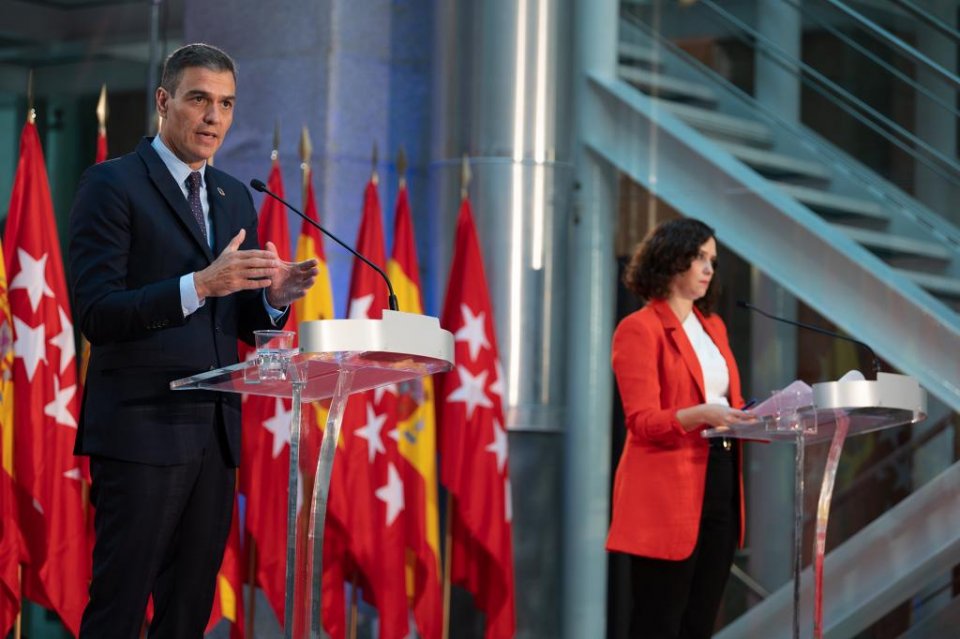Latest: Coronavirus in Spain figures (11 Jan)
Also read: Details of curfews & restrictions for all regions of Spain during ‘State of Alarm’
The Spanish government’s cabinet held an extraordinary meeting on Friday morning in order to formally declare a state of alarm for the Madrid region for the next 15 days. This is the maximum time permitted by the Spanish Constitution before parliamentary approval has to be secured.
It follows yesterday’s ruling by a regional court in Madrid rejecting the partial lockdown imposed last Friday on the capital and nine other towns in the region to slow the spread of Coronavirus (Covid-19) infections. The Spanish government since requested meetings with the Madrid regional government to maintain the restrictions implemented – but meetings were not held. The Madrid regional government had opposed the overall partial lockdown restrictions, requesting instead to maintain restrictions in specific healthcare zones.
Prime Minister Pedro Sánchez, who was in Barcelona on Friday morning, at an awards ceremony with Felipe VI, conveyed the decision to call a state of alarm in the Madrid region via a telephone call to the regional president, Isabel Díaz Ayuso, late on Thursday evening.
During Thursday, a top regional court in Madrid had ‘denied the ratification [of partial lockdown measures] on the grounds that they impacted on the rights and fundamental freedoms’ of the 4.5m residents affected by the restrictions, which had come into force from 10pm last Friday.
Without the measures being ratified by the court, police in Madrid had no legal grounds on which to issue fines for those not complying with the new restrictions. The police had also held back from issuing fines, while waiting for the court’s decision.
Commenting on the ruling, Spanish Health Minister Salvador Illa had pledged to ‘take the judicial decisions that better protect health’.
The state of alarm in the Madrid region has since come into effect on Friday afternoon, following its publication in the Boletín Oficial del Estado (BOE).
Spanish National Police and Guardia Civil officers have already been dispersed to enforce mobility restrictions. The same measures that were in place for the partial lockdown will now be enforced via the state of alarm. Click here for our previous report detailing all the measures. The capital city of Madrid is affected, as well as Parla, Fuenlabrada, Alcobendas, Torrejón de Ardoz, Getafe, Alcorcón, Leganés, Móstoles and Alcalá de Henares, which are all municipalities in the region of Madrid.

The new measures had been imposed upon Madrid by the Spanish Health Ministry, following a majority agreement reached between the Spanish government and the country’s 17 regional governments last week, at a meeting of the Inter-territorial Council of the National Health System. New restrictions are to be applied across Spain to all communities that exceed 500 cases of Coronavirus per 100,000 inhabitants, have a positivity rate in tests higher than 10% – and an occupation of Covid-19 patients in intensive care units (ICUs) of above 35%.
In the latest Coronavirus figures released by the Spanish Health Ministry on Thursday, Madrid has registered 37,572 infections in the past 14 days (258,767 since the start of the pandemic), which is currently 563.86 per 100,000 inhabitants for the same period.
After the regional court’s ruling on Thursday, Madrid regional president Ayuso asked for ‘sensible and fair’ measures to be agreed between the region’s health authorities and the Spanish government. She also recommended that citizens should not leave Madrid during the coming long weekend (Monday 12 October is a national holiday in Spain).
Since Spain entered its New Normality phase on 22 June after the central government ended the ‘state of alarm’ that had been in place from 14 March, responsibility for public healthcare and managing the Coronavirus pandemic had been left in the hands of Spain’s 17 regional governments.
Click here for all previous reports on: Coronavirus in Spain


